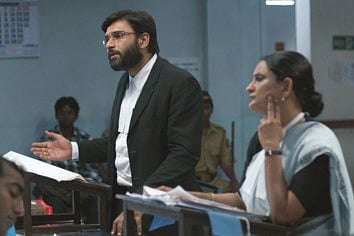‘Court’ is India’s Oscar film
Marathi film to represent world’s biggest filmmaking nation in best foreign language film category next year

Rookie director Chaitanya Tamhane’s Marathi film Court will represent India in the Best Foreign Language film category of the 88th Academy Awards, which will be held on February 28, 2016, in Los Angeles.
Court, a scorching indictment of India’s justice system and corruption in the courtroom, was picked by a secret 17-member jury headed by Amol Palekar from 30 nominations, which included Bollywood hits such as Bahubali, Bajrangi Bhaijan, Piku, PK and Haider, besides several regional films.
The decision was unanimous, according to a jury member who spoke to tabloid! on condition of anonymity. Until yesterday, there were two films vying to represent India but in a five-hour-long session on Wednesday in Hyderabad, where the nominations were screened, the jury finally picked Court as the country’s official entry.
After Court was adjudged the Best Feature Film at the 62nd National Awards in March, the Indian Express newspaper called it “a searing, unmissable film, the best you will see this year”. It was premiered at the Venice Film Festival in 2014, where it won the Lion of the Future Award for the best first feature as well as the top prize in the non-competitive Horizons category. It also won laurels at the Buenos Aires film festival.
Tamhane and producer Vivek Gombher (who plays a major role in the film, besides financing it), were unavailable for immediate comment because they are currently in Japan at the International Film Festival Fukoka, where Court is being shown.
Besides Gombher, the cast includes Marathi stage veteran Geetanjali Kulkarni, Pradeep Joshi, Usha Bane and Subodh Kushte. It has been shot by Mrinal Desai and edited by Rikhav Desai, The music is by Sambhaji Bhagat.
The film revolves around the arrest and trial of a Lok Sahir, or balladeer, who is charged with abetting the suicide of a municipal worker through his fiery songs. The arthouse movie closely examines the Indian judicial system from the perspectives of the accused, the defence lawyer, public prosecutor and the magistrate who sits in judgement.
Tamhane was apparently taken aback when Court won the National Award. He was surprised because the film is essentially anti-establishment and had to undergo a trial by the censors before it was cleared for commercial release.
“It is ironical that a movie which has freedom of expression as a key theme was subjected to censorship. We were given a choice to cut or to go mute. Editing out anything was out of question... so we chose to mute,” Tamhane had said.
Tamhane said that he was hugely inspired by Anand Patwardhan, India’s ace documentary maker, particularly Patwardhan’s Jai Bhim Comrade, a documentary about India’s oppressed Dalit community. He researched thoroughly before filming, including visits to courtrooms where trials were being conducted.
“I wanted to show the original chaos and the mismanagement. I also saw some scope for humour, which I have woven into the film,” he said.
Tamhane told an interviewer that he “found a very supportive producer in friend Vivek Gomber,” who had acted in a play directed by Tamhane earlier and helped him through the entire process, including paying him a monthly honorarium during scripting.
The director-producer duo is distributing the film independently and have not roped in any studio so far. But they might have to change their strategy after the Oscar nomination.
India has so far fared miserably at the Oscars. Last year’s entry, Liar’s Dice, stumbled soon after it was nominated. It failed to make it to the final five in the Best Foreign Film category. In 2013, the selection of a rather unimpressive Gujarati film The Good Road over favourite The Lunchbox as India’s Oscar entry triggered outrage and condemnation. But it reached the end of the road as abruptly as Liar’s Dice and most other Indian entries over the years.
Only three Indian submissions have made it to the final five at the Oscars so far — Mother India (which lost to Nights in Cabiria by one vote), Salaam Bombay and Lagaan.
A few Indians have won Oscars for their expertise in music, sound mixing or costume designing in foreign films, such as Gandhi and Slumdog Millionaire.
Satyajit Ray, an iconic Indian director, was awarded an honorary Oscar for lifetime achievement in 1992 in the twilight of his life. He gave his acceptance speech from a hospital surrounded by doctors and nurses. But many Indians consider the honorary doctorate conferred on Ray by Oxford University more prestigious than the golden statue.
— S. N. M. Abdi writes across Gulf News.
Sign up for the Daily Briefing
Get the latest news and updates straight to your inbox
Network Links
GN StoreDownload our app
© Al Nisr Publishing LLC 2026. All rights reserved.